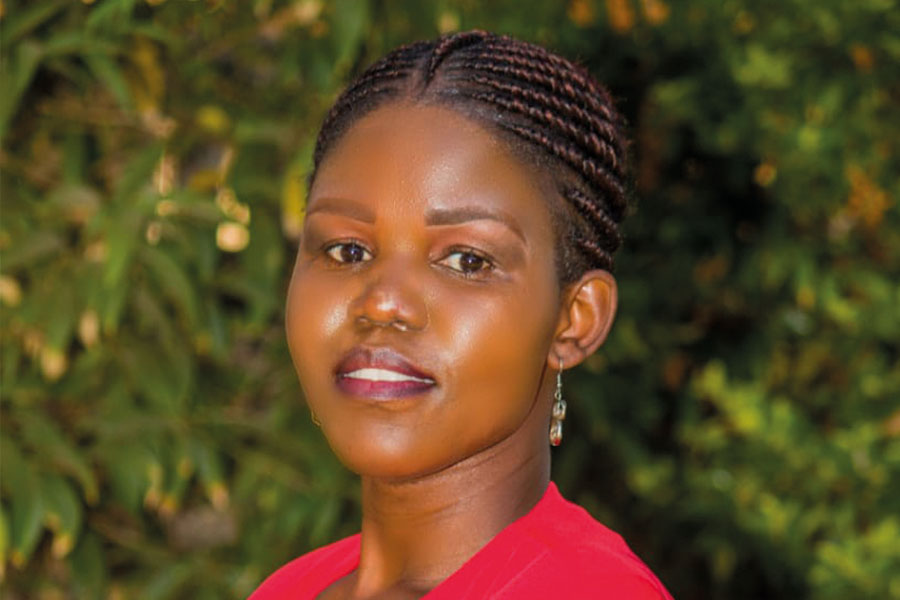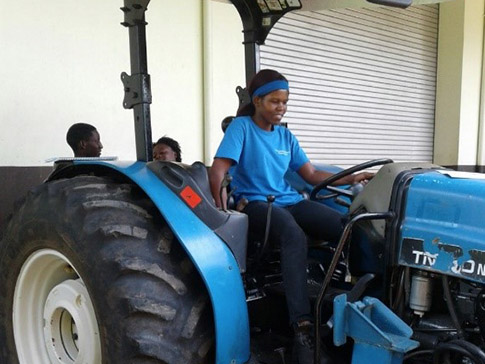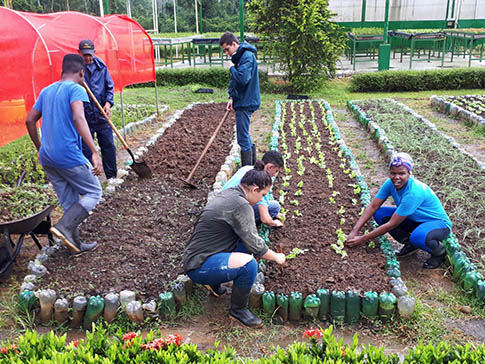CAMFED Association member and entrepreneur, Zimbabwe

Forget
When I was in Grade 2, I lost my mother. I was only seven years old. I went to live with my grandmother, who by that time was 86 years old. All I can say is my grandmother was a superhero! She was a mother of the house, a father of the house, and a grandmother of the house. She would make sure that we had something to eat, and that my cousin and I had the opportunity to go to school. Her only means of supporting us was by farming — we would join her, help her work in our neighbors’ fields, so that by the end of the day she could afford our school fees, stationery, and uniforms.
I’m also grateful to organizations in our community that extended a hand to my grandmother — a charity and the government school bursary scheme chipped in for my primary education. However, when I finished Grade 7, which is the last stage of elementary education in Zimbabwe, I knew the costs of secondary school were out of our reach.
I decided to approach the school secretary and the Head, to tell them my story. They introduced me to CAMFED and together managed to secure me a place to go to boarding school. Throughout my secondary education CAMFED supported me with school fees, school uniform, stationery, and sanitary wear, to make sure that I did not miss a single day in class. During school breaks I stayed with the secretary who had helped me, and she became my mother. She provided me with supplies like towels, soap, and washing powder.
That support really pushed me to study hard because I wanted to change the narrative not only for myself but for other girls in my community.
Though I was excelling at school, I still faced some family problems. My older brother suddenly fell ill, and I was the only one who could offer support to my sister-in-law to help care for him. I went to stay with them and eventually I missed the start of the new term at school. Despite my absence CAMFED did not give up on me — the District Officer followed up and helped me return. I went on to pass my end-of-school exams and join the CAMFED Association — the network of women leaders who received support from CAMFED in our education.
Our sisterhood helped me through an uncertain time after I left school and was seeking opportunities. Because we are all young women with similar backgrounds, we understand each other’s challenges — even the simple barriers, like not having a bus fare to get to the town, not being able to afford a meal there. My CAMFED Association sisters supported me to get to the CAMFED office, shared their lunch with me, and helped me to complete my university application. They are part of the reason I was able to become a Mastercard Foundation Scholar studying Agricultural Sciences and Natural Resources Management.
With the help of my CAMFED Association sisters, I made it to EARTH University.
Whilst I was at EARTH, in 2018, I decided to start my own business to put into practice some of the climate-smart techniques I was learning, specifically post-harvest processing. I’d recognized the need in my home community for efforts to improve food security and prevent waste. Many rural African communities end up losing a large portion of their hard-won harvests because of a lack of cold storage facilities, lack of post-harvesting processing and the surfeit of certain crops. When the produce perishes it is not only to the detriment of farmers (often women) and families, but also to the environment because the crops emit methane as they decompose.
With some colleagues I started Chashi Foods, which is a socially-minded and environmentally-responsible enterprise that produces natural, dried foods. We dry tomatoes, apples, bananas, paw paw, and pineapples, as well as herbs and spices like oregano, thyme and garlic.

Forget operating a tractor during her time at EARTH University.
We come to fair trade arrangements with rural farmers, buying their produce directly to help improve their profits and their standard of living. At the same time we are contributing to the drawdown of emissions and building resilience in terms of food storage.
I always say we rise by lifting up others.

Forget planting out crops with other EARTH University students.
Through the CAMFED Association I have also been doing a lot to build resilience to climate change — passing on knowledge through a cascade system. With other young women who have studied at EARTH University and with experienced farmers in our network, I have contributed to developing CAMFED’s climate-smart Agriculture Guide program. Through our Agriculture Guides we are creating a ripple effect, aiming to reach 50,000 farmers.
We listen to and learn from community members, tapping into the Indigenous knowledge they have, and combining that with our innovative techniques like intercropping, drip irrigation, afforestation and soil analysis. We have also introduced the Patsari stove, which is more fuel efficient — so doesn’t require a lot of firewood and doesn’t emit a lot of carbon dioxide into the atmosphere.
Members of our network have been teaching each other food preservation and other methods to help us run successful agri-businesses. In turn, with the profits we make, we invest in the next generation of girls. We each contribute in different ways — helping CAMFED’s virtuous cycle continue. We are supporting more girls to go to school, training more graduates in sustainable business and climate-smart farming, and empowering more communities to fund their children’s education.
We share our success with the world, and in 2019 our contribution was recognized with the United Nations Global Climate Action Award. Esnath Divasoni, who was my classmate at EARTH University, accepted the award on behalf of the CAMFED Association. So this is a great achievement and a motivation to younger girls and others in our communities to get involved with our work.
Agriculture is life in our communities.
It’s crucial to note that the majority of food we consume in Africa is being produced by women, who are often ‘invisible’ as small-holder farmers. Climate change affects production, availability of food, and chances to earn a living. And when a climate shock — like a drought or a cyclone — occurs, a lot is expected from a woman. She shoulders responsibilities in the family and the community that become more challenging and time-consuming — including fetching water, collecting firewood, perhaps protecting crops or animals. It’s also more likely to fall to a girl-child to look after siblings, maybe drop out of school, and even get married to lessen the burden on her family.
Women and children are also more likely to suffer death or serious injury — and not just during the shock itself. Afterwards they may be forced to live in improvised shelters, where they are vulnerable to theft and abuse. If buildings like schools are destroyed, that safety net for girls disappears too. It’s clear to me that climate change has a more severe impact on women and girls, and is worsening gender inequality.
If a woman is gaining ground in education, she is also gaining ground in fighting climate change, and gaining ground in fighting gender inequality.
After Cyclone Idai hit in 2019, I joined CAMFED Association efforts to keep girls in school in Manicaland province. The floods had cleared away crops, leaving the children without food to eat, and destroying the source of income for their parents to send them to school. So as an Association, we extended our hand, partnering with CAMFED Champions in the Mother Support Groups. We offered training on how to cope, how to adapt, how to produce food sustainably using climate-smart methods, and to promote nourishing feeding programs in schools. We also donated essentials to the affected families — paying school fees and providing food — to make sure children could stay in school.
Then with the challenges caused by COVID-19, I tried to support farmers as best I could through my business. We created a WhatsApp group to connect us and work out what produce we could buy locally (to comply with restrictions and avoid too much travel). We managed to find new suppliers and we also suspended drying for a while, instead selling fresh produce, which was in higher demand. At the same time we looked for ways to help others have a reliable source of income — the lockdown made it more likely that their harvest would perish before it could be sold. So we came up with a guide on how to dry tomatoes and vegetables, translating it into Shona as well. I’m so happy that we trained a farmer in Guruve and she was able to sell her produce to the local hotel. That was amazing!
I want every boy and every man in society to understand that girls’ education is also important to them because it brings food to the table, a happier and healthier home and planet.
At every step, my story is about the women who have supported me, and the women I am now supporting too. I still have the backing of CAMFED — Ms Murimirwa, the Executive Director – Africa, and Ms Nkala, the National Director of CAMFED Zimbabwe, provided me with recommendation letters that helped me enrol at the University of Edinburgh Business School. I’m studying for my Master’s degree in Entrepreneurship and Innovation, which I hope to complete later this year.
It is said that girls with dreams will become women with vision. So I will keep collaborating with my sisters to make sure every girl in Zimbabwe and beyond can fulfil her potential. I’m standing as a role model — if I can do it, others can too.
In October 2020, Forget lent her expertise at the UNGEI@20 Forum event, speaking in a panel discussion on Feminist Action for Climate Justice.
Watch Forget and fellow CAMFED Association leader Rufaro at CAMFED’s webinar ‘Women in Africa Leading Climate Action’
Read Forget’s interview on Devex about how education is helping her strengthen resilience to climate change in rural Zimbabwe
Listen to Forget sharing her inspiring life story on Cambridge 105’s podcast ‘Women Making Waves’
